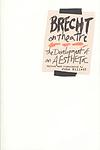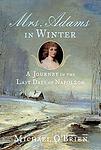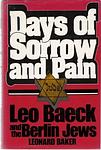The Greatest "Nonfiction, Berlin" Books of All Time
Click to learn how this list is calculated.
This list represents a comprehensive and trusted collection of the greatest books. Developed through a specialized algorithm, it brings together 300 'best of' book lists to form a definitive guide to the world's most acclaimed books. For those interested in how these books are chosen, additional details can be found on the rankings page.
Genres
Countries
Date Range
Reading Statistics
Click the button below to see how many of these books you've read!
Download
If you're interested in downloading this list as a CSV file for use in a spreadsheet application, you can easily do so by clicking the button below. Please note that to ensure a manageable file size and faster download, the CSV will include details for only the first 500 books.
Download-
1. The World Of Yesterday by Stefan Zweig
The book is a poignant memoir reflecting on the transformative events and cultural atmosphere of Europe before World War I, through the interwar years and into the rise of the Nazis. It captures the author's experiences of growing up in a vibrant pre-war Vienna, the intellectual richness and artistic achievements of the time, as well as the profound sense of loss as the world he knew disintegrated into chaos and totalitarianism. With a mix of nostalgia and despair, the narrative serves as a lament for the lost world of European culture and as a warning about the fragility of peace and the human cost of war.
-
2. A Woman In Berlin by Marta Hillers
The book is a powerful, anonymous diary that provides a harrowing first-person account of the final weeks of World War II in Berlin, from April to June 1945. The female author, a journalist, describes the chaos of a city under siege, the brutality of the occupying forces, and the struggle for survival faced by the women of Berlin. She candidly records the widespread rape by Soviet soldiers and the complex web of emotions, compromises, and small acts of resistance that characterized daily life during this period. The diary stands as a poignant testament to human resilience and a stark examination of the often-unspoken atrocities of war.
-
3. Brecht On Theatre by Bertolt Brecht
"Brecht on Theatre" is a seminal work that compiles various essays, notes, and journal entries that delve into the theories and practices of influential German playwright and director Bertolt Brecht. The book explores Brecht's development of Epic Theatre, a style intended to provoke rational self-reflection and a critical view of the action on the stage, rather than emotional manipulation. Brecht's ideas emphasize the importance of the audience's engagement through a variety of innovative dramatic techniques, including the alienation effect, which aims to prevent the audience from losing itself passively and completely in the character's emotions. This collection serves as an essential guide for understanding the evolution of modern theatre and Brecht's enduring influence on dramaturgy and performance.
-
4. The Last Days of Hitler by Hugh Trevor-Roper
This book delves into the final days of Adolf Hitler's life, providing a detailed account of the events that unfolded in his bunker during the last ten days of World War II. It is based on interviews with surviving members of Hitler's close circle and other witnesses, as well as captured German documents. The author presents an in-depth analysis of Hitler's mental state, his relationships with his staff, his suicide, and the subsequent cover-up by his loyal aides. The book also debunks various myths and rumors about Hitler's death and escape.
-
5. Stasiland by Anna Funder
This non-fiction work delves into the haunting legacy of the Stasi, the secret police of the former East Germany, through a series of personal narratives and interviews. The author explores the pervasive surveillance and oppression that characterized the German Democratic Republic, weaving together the stories of those who resisted the regime, those who worked for it, and those who were its victims. The book serves as a poignant examination of the human spirit under the strain of totalitarianism, revealing the scars left by a society where privacy was eradicated and trust was a commodity few could afford.
-
6. Mrs. Adams In Winter by Michael O'Brien
"Mrs. Adams in Winter" is a captivating historical narrative that follows Louisa Catherine Adams, the wife of John Quincy Adams, on her perilous winter journey across Europe in 1815. Amidst the tumultuous backdrop of the Napoleonic Wars, Louisa travels from Russia to France to reunite with her husband in Paris. The book not only details the physical hardships of her journey through a war-torn continent but also delves into her personal struggles and reflections. Through this intimate portrayal, the book offers a unique lens on the political and social upheavals of early 19th-century Europe, while highlighting the resilience and complexity of its central figure.
-
7. Berlin: The Downfall, 1945 by Antony Beevor
The book provides a detailed account of the final months of World War II, focusing on the Battle of Berlin. It chronicles the brutal and chaotic fall of Berlin, the capital of the Third Reich, to the Soviet Red Army in 1945. The narrative presents a grim picture of the atrocities committed by both the German and Soviet forces, the mass suicides by the German populace, and the horrific conditions of the city during the siege. It also explores the political maneuvers behind the scenes, offering insights into the decisions and actions of key figures like Hitler, Stalin, and Churchill.
-
8. Days of Sorrow and Pain: Leo Baeck and the Berlin Jews by Leonard Baker
This book offers an in-depth account of Leo Baeck, a prominent Rabbi who served as a spiritual leader for the Jewish community in Berlin during the rise of Nazism. The narrative explores Baeck's efforts to maintain the dignity and faith of his community amidst the horrors of the Holocaust, his eventual internment in a concentration camp, and his post-war role as a representative for the survivors of the Holocaust. The book provides a poignant reflection on a dark period in history, highlighting the resilience of the human spirit in the face of extreme adversity.
Reading Statistics
Click the button below to see how many of these books you've read!
Download
If you're interested in downloading this list as a CSV file for use in a spreadsheet application, you can easily do so by clicking the button below. Please note that to ensure a manageable file size and faster download, the CSV will include details for only the first 500 books.
Download






